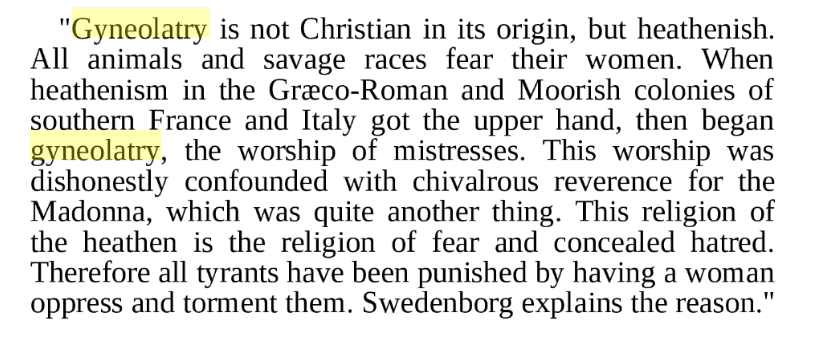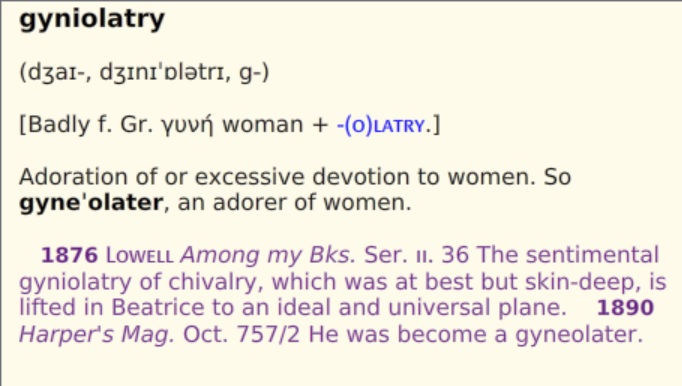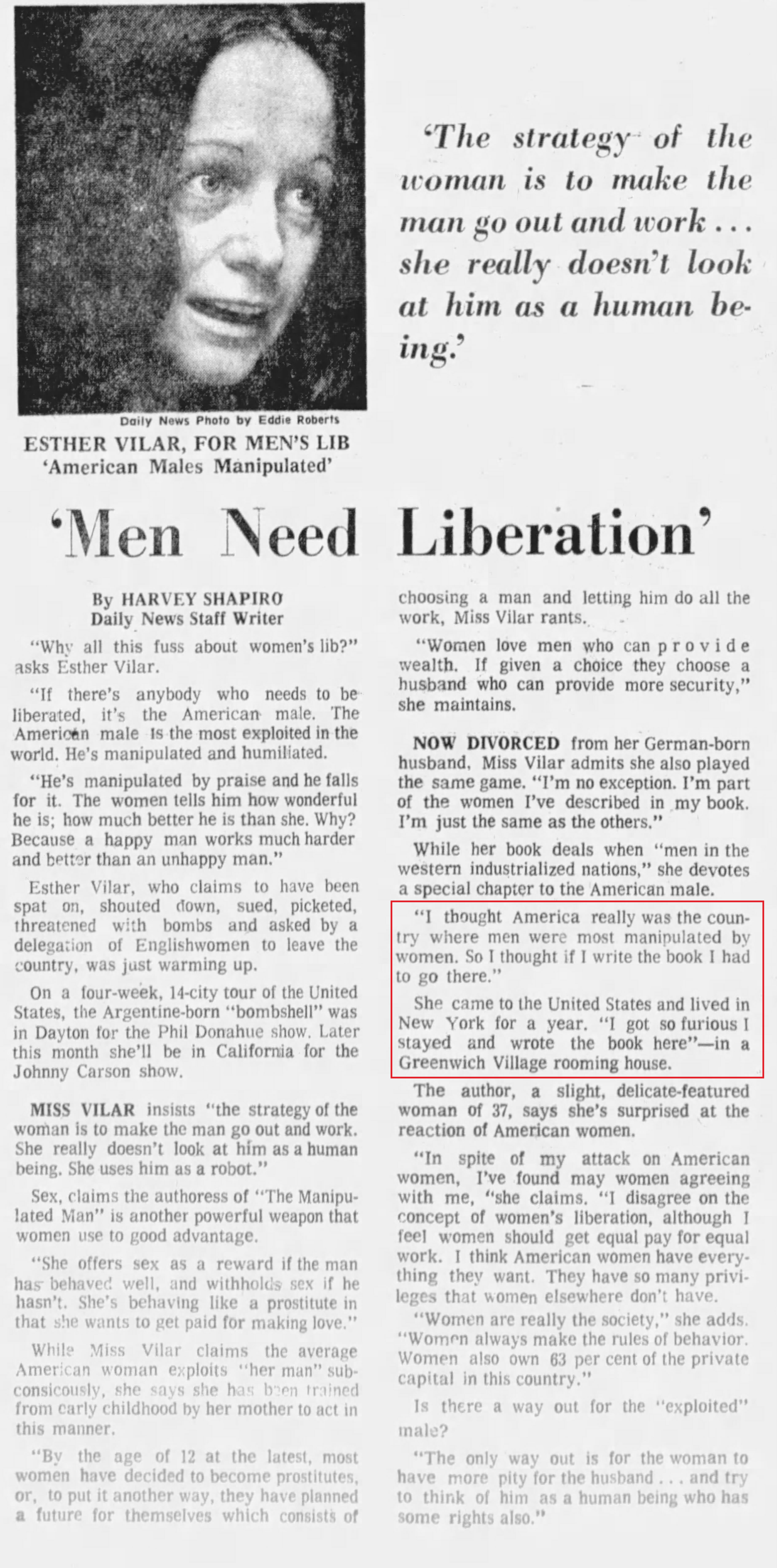
The following are excerpts from Vilar’s Das Ende der Dressur: Modell für eine neue Männlichkeit (The End Of Manipulation: A Model for a New Masculinity). The book, the third in her trilogy on the manipulation of men, has not yet been translated to English and the following excerpts, translated via Google Translate, are rough and likely carry inaccurate translations in parts. Many of her ideas below can be considered outlandish work of fiction today, however nobody can argue that Vilar wasn’t passionate about men’s welfare, and she took considerable risk to stand up in public and speak her mind.
____________________________________________
The man must become useless
As long as masculinity is equated with utility, “real” men will always be those that make themselves useful. The introduction of a new rating system for masculinity would therefore assume that men are not more useful to women than the reverse is the case.
Only when marriage means something other than the man doing almost everything for the woman, and the woman doing almost nothing for the man, could men become male in a new way – in a way that has to do with your gender and not with your usability as before. So, if men wanted a less embarrassing existence for themselves or other men, something would have to change the current social fabric.
As has already been said, such changes should not be enforced against the will of the powerful nor against the needs of the human psyche. In the search for a viable alternative, one would have to take into account, on the one hand, that our western industrial society is a matriarchy, and, on the other hand, that couples want to live in communities and raise children. Reform efforts that do not take into account female power or the human need for lasting ties – marriage, family – are condemned to failure from the outset.
A solution of the problem described so far would therefore assume the following advantages:
- It would make the man uninteresting as an economic factor for the woman (without, however, jeopardizing the economic structure).
- It should be a collective action. (Men who want to change their situation in one-on-one actions quickly become united and soon become useful again.)
- It would have to defend not only the interests of men, but also those of children and the elderly against women. (You can not solve a weak person’s situation on the back of other weak people.)
- It would have to guarantee the maintenance of gender-typical behaviors. (Without male and female role behavior, most people would be bored with the world.)
- She would have to please the women. (The status envisaged for them would at least seem equivalent to them.)
One solution that would meet these requirements would be a general working time cut to five hours a day (introduction of the twenty-five-hour work week), accompanied by the following measures:
- a. Salary reduction, which corresponds to the reduction of working hours.
- b. Increase in social security contributions.
- c. Pupil salary, which, regardless of the income of the parents and relatives, covers all basic material needs of those preparing for a profession. (This would affect toddlers, students, apprentices, and anyone who wants to change jobs.)
- d. One-year leave for a mother or father after the birth of a child, Special leave for illness of a child.
- e. Abolition of nurseries, hoarding and all – day schools in favor of Five-hour kindergartens for children from one year and five-hour Teaching in all schools and universities.
- f. Abolition of the obligation to retire in favor of self-elected pension limits.
- G. Abolish the right to work of equal value in favour of a right to retraining.
- H. Prohibition of overtime.
Through this model the most important requirement for a new masculinity would be given, for as we shall see, women would work after such a reform. And as soon as she does that they would choose their partners in a different way than they do today. They would no longer judge men by their usefulness, but by their suitability for love.
But let’s first examine the economic viability of all these proposals, because everything else depends on that.
The workforce has doubled
The prerequisite for any reduction of working hours is the assurance of economic stability. All historical working time cuts were therefore always more the consequence of economic calculation than humanitarian considerations. One factor remained practically constant: the workforce potential. Because One could only count on one half of the adult population, the men. The Women were often pregnant, had to breastfeed for a long time, had many children and had to have one supply complicated household. Working time cuts were therefore either through the use of Machines or by improving the performance of the available Workers reachable. When you replace men with machines, wherever possible, and with them In addition, granted longer breaks, they consumed more slowly. Your overall performance but remained constant or even increased, the economic structure remained intact.
Since the invention of artificial breast milk, since the birth control by pill and Abortion and since the partial automation of housework, however, we are in A new era: There are twice as many workers as before, because women can now too work. This creates three new opportunities for the economy:
- a. You can let women work instead of men.
- b. You can let a part of the women work and thus the general one Shorten working hours.
- c. You can let both sexes work the same and thus the Shorten working hours significantly.
Why the first alternative is utopian has already been discussed. The second is already realized We owe her and the automation to the forty or forty-five-hour week and the extension of annual leave. The third and really sensational option, however – drastic reduction of working hours through equal participation of both sexes in the work process – is not even discussed seriously. It would be in highly industrialized countries since at least ten years. But apparently no one dares, from the duplication of the Workforce potential – probably the biggest social change in our history – the practical one To draw consequences.
The five-hour model is realistic
For simplicity’s sake, let’s assume that the western ones Industrialized countries are satisfied with their economic performance. Let us further assume that in full employment, ie. the total number of hours worked Need of the economy covers and that the number of the unemployed to the vacancies in the desired Relation stands. Of course that does not correspond to reality, because in every country there is recession and Boom, periods of unemployment and over-employment. But for our calculation At the moment, these economic aspects are of no concern.
The condition for the reform proposed here would be the preservation of the economic status quo Country in which it is performed. Because although it is a reduction in working hours from humanitarian considerations, the functioning of the economy should not be up for discussion. Reforms that the preservation or enhancement of the economic performance of a country not as one of its The most important basic conditions always end up at the expense of those whose position they are should improve originally. The question is therefore: how much could working time be spent in Industrialized countries reduce and / or how could the living conditions of their inhabitants be humanizing without such a measure endangering the economy?
Let’s base our calculations on data from those western industrial countries – USA, Canada, Australia, West Germany, France, Great Britain, Belgium, Sweden, Denmark Finland, Norway, Austria, Switzerland – where the forty-hour week more or less in which about every second working woman is already employed. If so Instead of every second, all employable women would work in these countries – and not just that one-third, but half of the female active population would be – so would the total number of active workers will increase by one third and, consequently, the total number of reduce the number of hours worked by each employee by one quarter. If you are in If these countries have to work eight hours a day today, then one would have to look for an optimal one Exhausting the female workforce only six hours a day.
This number is obviously inaccurate and also too optimistic: it does not take into account that in the of the working women about one-third only work by the hour they work does not take into account that in most of these countries women average two to five years earlier retired as men, they do not take into account the one to three years men because of their Military service as a workforce, it does not take into account the industries in which the Hour-week still belongs to the realm of Utopia (Freelance, Farmers), she takes into account not the overtime and the “moonlighting” of men, it does not take into account the unreported number of only for tax reasons in family businesses declared as gainfully employed women and not those of the for the same reasons in private households undeclared “Zugehfrauen”. If you have all these Data, as far as they appear in the statistics of the various countries in the calculation involves an average daily working time of more than six hours.
However, it is not the six or seven but the five-hour day that is up for debate here. This would be possible because a drastic reduction in daily workload impacts Quantity and quality of performance would certainly allow further reductions in working time would:
- 1: Increase the quantity of work
- a. Less sick leave due to illness: Both the real and fake diseases would go back. By longer Rest breaks kept workers healthier, by shortening the working hours they would maybe even prefer to work and therefore less often report sick.
- b. Less work loss due to retirement: The Eight-hour day is for most older People too exhausting. At five hours Working hours would take many of them up practically want to end their lives, because they would become as a full member of society feel. The proposed reform would not be mobilize only the female workforce, but also the retirees. (What positive consequences an introduction of self-imposed pension limits for The care for the elderly would be in a later Chapter explains.)
- c. Loss of work due to premature death: By reducing the power pressure would come it leads to an increase in men Life expectancy, sooner or later the female would adapt, in turn, only would decrease slightly or not at all.
- 2: Increase the quality of work performance
- a. Because the quality of work in rested people correspondingly larger, would become larger Rest breaks the effectiveness of the work, the Job offer (= offer of working hours per Time unit). That’s exactly what it was always the most important argument for the previous ones Working time reductions. The performance low after the Lunch break would be canceled as well as the last hours.
- b. The quality of female work would to adapt to the male, because women would become more ambitious and stronger than before Participate in the competition. Because they work all their lives would need a career advancement for Women are just as worthwhile as men. These Increase in female labor supply would come benefit the economy as a whole.
Only in cooperation with economists, rationalization technicians, sociologists and Behavioral researchers could calculate exactly how strong the factors mentioned on the Work and how much working time could be saved in addition. Already however, according to an initial preliminary calculation, it is fair to say that the five-hour working day in the Range of possibilities and that the conditions for the reform proposed here are are realistic.
Half a day of freedom
The situation looks even more favorable, if one does not calculate the working time, but the Time of absence of home based. Most professionals have a lunch break from one to two hours, so if you go out of an hour’s commute, average separated from their families for ten to eleven hours. The proposed model would eliminate the Lunch break. Rest breaks of fifteen to thirty minutes would take five hours. Working hours are sufficient, with lighter activities one could perhaps completely do without it.
The employee would therefore, with breaks and commute, on average, only six to six and a half instead of ten to eleven hours away from home. That is, he wins through the five-hour rhythm practically half a day. Other than the five-hour rhythm, z. B. a week, month or Annual rhythm (three days of work, four days of free time, seven months of work, five months of free time, etc.) would be – with the exception of those professions, which bring a greater distance from the place of residence (Aviation, shipping and railway personnel, truck drivers, agents) – not for the following reasons recommended.
- All the benefits just mentioned, which work hours from six to five hours would have to be eliminated.
- And because then no one alone would be responsible for a particular task, would create an economic chaos, because of a flourishing economy essential competition between workers would be disturbed.
- Children would be in institutions for about three days, four days for their parents or seven months in institutions and five months in her parents However, it has been proven that children need a certain degree of regularity Continuity in the caregiver if they develop optimally should. In addition, hoards and schools would be for full-time child care would have to be set up, although they would only be needed on a temporary basis, economically not profitable.
- Virtually all adult males are from their mothers and theirs Religion educated to masochists. You first have to do something before you become can have fun. They want to enjoy themselves, and they want to be allowed to pay.
You can not do reforms against the needs of the human psyche: men need the rhythm of performance and relaxation. Long rest breaks in one go with them to emotional disorders, as one can see in times of unemployment. Maybe that could someday overcome this educational damage. Until then, you would have to join them possible reforms.
You earn half and still live better
Work is a service that you pay for. Unpaid services are provided Coercion, masochism, the need for validity, stupidity, personal affection, or Pleasure seeking. In general, every person who does something that others may need, too and usually there is nobody who would make something useful for free. Also housewives receive salaries, but they are rather unbureaucratically handed over by their husbands. Which manipulations they owe their overpayment has already been described elsewhere.
The fact that you need money and that you usually only work for money, allows The wages and salaries of the company largely control the living conditions of the society Individual – it influences its safety, comfort and freedom. But there the Society consists of all individuals, this is harmless in democratically governed countries. If the majority were unpleasantly affected by a particular measure, they will not accept it from the outset. The general public can therefore by general measures – by Laws – improve the social situation of individuals, they can not worsen them.
One of the opportunities for social improvement is the diversity of wages and benefits Salaries. Because in general you will only quantity and quality of his work increase if a wage increase beckons, and only then the effort of a longer study if you get into a better salary level right from the start. Eulogies and other awards are an incentive for permanent performance increases without effect. There people, Those who try for nothing, who are considered stupid by most others, can be immaterial Rewards basically harm the reputation of a worker. To economic progress In a country, it only happens when every single person is fully committed to their work. One Such personal commitment can only be achieved through personal benefits.
So, even if all work were the same, it would be unequal in the interests of all the same work pay. But work is not the same, and they also require different levels of knowledge. The The general public therefore has a double interest in unequal pay. Only if you have difficult, Dangerous, exhausting, boring or repulsive works better rewarded than others, is always a sufficient number of services available, and only if you are manufacturers and Allow brand representatives to reward their efforts more than a platonic reward Enjoying the increase in sales, the supply of consumer and luxury goods is always slightly larger than demand.
Moreover, it is only by “unfair” pay that citizens have some freedom to guarantee. Since pleasant work is rare and, of course, all at the same price In this case, the majority would have to be compelled by a minority will take over the unpleasant duties also necessary. Apart from the loss of As a result of the dynamic economic potential that this would entail, it would de facto be abolished Mean freedom of expression. Because if you force the majority to do something they do not want, then sooner or later you have to prevent it from agitating against it.
In other words, unequal pay is unfair, because people have different talents and have different favorable starting positions for their lives, but equal pay would be even more. Because with unequal pay the economy works better, you can on this Gradually giving everyone at least some extra time, freedom and prosperity. at Equal pay would have no right to one’s own time or one’s own opinion – and money. You would have as much as everyone else, but less than that. If social, what is that Benefiting less privileged sections of the population, then it is social, workers different pay.
But let’s go back to the working time cut. Of course, such a reform would have to be through corresponding law to be secured. Only benefits that work within the five-hour work period should be rewarded by employers. Since one does not work without wages, would to stick to this rule and be free for the rest of the day.
New laws, as we said, are accepted in democracies only if they are majority guarantee the population an advantage. A reduction in working hours would not only bring the Advantage that the free time for everyone is almost twice as long, but they would also have the disadvantage that the Salaries are cut almost in half. So if, for example, someone turns eighty in eight hours If he earns a dollar, he could only spend fifty dollars after five hours of working hours otherwise, it would not be economically viable. And here is the biggest difficulty Reform: Without proper preparation, workers would be cut short Income disagree. You would like the reduction in working time proposed here Short-time working – a measure practiced by individual companies in times of crisis Wage savings – and reject the project.
The first step towards a new legal regulation would therefore be an awareness-raising campaign widest level. Working people would have to realize that they have more time through the reform, but despite the necessary pay cut would not have less money. Because in the current situation one may be his.
Do not keep the wage. In general, it not only finances your own life, but also finances it that of the so-called “dependent” persons. After the reform, everyone would be able to financially self-supply. Nobody would have to share their money with housewives, children and other needy, because such needy would no longer exist. Only if all this were clear, one could to the Dare to draft a law.
The moral principle of the wage reform proposed here would be the following: Human Communities are built to protect against a hostile environment and operate on the Basis of division of labor. Anyone who voluntarily lives in the company of others, therefore, does not just have one The right to protection by them, but also the duty to protect them – he is from social position not only legal entity, but also manpower. Who only of his Makes use of rights, but seeks to avoid the obligations, lives at the expense of others and is responsible for a community a parasite.
As already said, this parasitism is in Western societies most successful of women and most spectacularly practiced by criminals. Both express themselves before their obligations and indirectly impose them on others. By the reform one could make female parasitism largely impossible. And there work, as soon as women work so much like men, would lose much of their terror – because of the stamina and responsibility of the individual would be considerably smaller – there would also be a consequence of female equality less crime. Because in today’s situation remains for a man who is not on women Crimes often the only way to relinquish the depressing destiny of his sex to escape (and only because of this are offenders in western industrialized countries also to 80 percent male). After humanization of working hours and cancellation of price maintenance for use The risk of a criminal act would be too great for some of the female vagina. Right now It does not really matter if a man founds a family or if he leaves without this detour goes to his walls. But after the reform, there would be a bit of freedom outside, and the company of On the one hand women would be cheaper and on the other hand more interesting than now.
Higher social contributions initially inevitable
However, since all these savings do not cover high social benefits (at least would be enough to cover the deficit in the first decades after the transition) Balancing tax increases. That means you would not only have salaries proportional to Reduce working time reduction, but also with higher social security contributions strain. So, if somebody earned eighty dollars in working hours before the reform, If he worked five hours a day, he would not be fifty, but forty-five or even forty Refer to dollars. Of course you could not cut all salaries so drastically. Because even if you only have to feed yourself with it, many workers would be already below the Subsistence level. It would therefore have minimum wages to be set, the amount of about the Full scholarship of a student would correspond.
The progression of salaries would still be left to the free play of the forces. Because it would be in the general interest to set salaries down – poverty leads to social unrest and therefore harms everyone – but upwards they should never, also in the general interest be limited. The maximum performance of the clever is vital to the welfare of the less Refined: Who brakes the élan of the top earners, acts anti-social, as much as he morally in the May be right. The difference to today’s situation would therefore lie in the fact that after the reform everyone would bring home just over half of their current net salary.
One engineer, for example, who now enters a company with an annual salary of twenty thousand dollars and that ten-year salary increases to forty thousand dollars, then ten thousand start and come to twenty thousand after ten years. But that would not hurt him, because if he had gotten married in the meantime – and according to statistics this would almost always be the case – then yes also earn his wife, and his children would be secured by their own income anyway. Of the Standard of living of the family would be – provided that the wife would be with her salary approximately in the same group – even slightly higher. Unlike today, however, this engineer could not do more be exploited to the limit of his physical and mental capacity by his company, while his wife was lamenting or bored in her suburban bungalow. And unlike Today, after the reform, there would be neither husband and wife nor children and parents material dependency relationships. A separation would not for any of the family members financial ruin mean: After a remarriage, the man would be neither with alimony for the First family charged, nor would his wife have to pursue him with payment claims. The kids could stay with the parent they felt most comfortable with – time for them both.
Similarly favorable it would look at the lowest level of the social ladder. Because the financial situation A helper would not be as brilliant as an engineer, but he too would become a life which he can not even dream of now. He would have twice as much time and his job It would not be a consequence of discrimination but your own decision – and there is a lot Respectable reasons for choosing a five-hour job without responsibility can. And suppose he only received the legally guaranteed minimum salary and would do so modest as today a state-subsidized student living in a furnished room, so could He still founds a family. Because his wife would have one in the worst case Minimum salary available – so you could join instead of two furnished rooms together One-room apartment afford. With the birth of the first child, the first day salary would increase the family budget again. You could already do that a modest two-room apartment, and for the minimum need for food and clothing would be also taken care of.
Still, this family life could never be for either the laborer or his wife to be a straitjacket. With a separation, the relationship could easily be unraveled. What Today, for a poor person who was wrong in choosing his life partner, in the realm of utopia – a new love and the founding of a second family – would be realizable for him as well. And for his children who are now after such a tragedy mostly in homes or with their grandparents land, the separation of the parents would have only emotional meaning.
Each for himself and everyone for everyone, would be the common denominator of the economic side of the reform. You might be as selfish as you wanted, and nobody could hurt you. It must be in one In any case, all citizens will be provided with care: why – as it is obviously possible – it is not set up so that no personal dependency relationships can arise from it? It is hard enough to maintain happy relationships with other people over a long period of time. If material interests are involved, as is the case today in almost every relationship between man and woman Woman or parents and child is the case, it becomes impossible. At least this one difficulty would be through The new wage policy has been eradicated once and for all.
Consequences of a new masculinity: Voluntary equal obligation
Salary reduction plus reduced working hours would be the ideal technique for infiltrating the female Supremacy, because after such a measure, the women would have to work and want.
It is obvious that women would be forced to work due to massive salary cuts. It is an economic law that automatically reduces the female wage level Workforce potential is mobilized: In the fewest families would be the merit of a Adults are enough to feed two, three or more people. But you can, like said, women in a democratic society do not force anything. Against the will of women could not enforce a general salary reduction. Indirectly exercising political power, would be a government that by such a measure the female part of the population too Wanted to force work in a few days. Of course, the men would for the To overthrow it. Women do not make revolutions, it is enough that they wish them. The women So you want to work. Since you can not force them to equal obligation, you have to do it allure. For a temptation, however, the five-hour model would offer the ideal conditions because it could thus both the disadvantages of housewife status as well as the all-day and Remedy part-time employment. Since a five-hour day does not represent unbearable stress and at the same time solve their other problems – boredom, loneliness, economic and social dependency, sexual and mental frustration – housewives would after here proposed reform is not reluctant to work. Those left over, because their established men too If you earned enough in less hours you would be amazed like fossils, that is, you would be pushed into outsider roles and would sooner or later want to adapt. Boy Girls would no longer opt for this “profession” from the outset.
In the real professions, however, there would be neither full-time nor part-time work with »female Discrimination “, but only five-hour work, in which no sex preferred or disadvantaged. Because when male and female workers by and large alike would be reliable, you would each prefer the applicant with the better qualifications – one could not afford another attitude in a free economy. The three disadvantages of Half-day work – hard to find, hard to maintain and difficult to build – would that there was only such work left in the world. What remained the generally accepted Benefits of part-time employment.
That women would really work under changed conditions is already possible to prove. In all Western industrialized countries, the vast majority of teachers are female Even up to ninety percent of elementary schools – though the teacher’s job is longer Training time and a certain intellectual inclination. But teachers have one Special status: Your free time – if you include school holidays – is at least twice as long as the the other professionals. Depending on the country and type of school, teachers from western industrialized countries complete weekly 18 to 32 lessons of 45 minutes, that is 13.5 to 24 hours. The time she otherwise invest in their profession depends largely on their goodwill and their routine. Most teachers are therefore neither by their children nor by their household of the To hold a professional practice, there is the lowest turnover of all women’s occupations. And since this is so, there is no “female discrimination” either at state or private schools male teachers are preferred. That then the school directors are usually male again, is due to the fact that a temporal commitment is required at this level, to which only a few Teachers are ready.
Men, “the legislators,” could therefore afford it without danger, a general, legal established working time reduction – the majority of women would not mind objection. After an appropriate education campaign, they could detail the reform to prepare.
Bad times for the trained
But maybe the resistance would come from another side? Maybe he came from the men?
After the reform, they would be as independent as possible in today’s circumstances, because outside their short working hours, they would be completely free and could do and say what they wanted.
Even at the workplace, they could risk more. Because of their servility no more The economic and social position of an entire family, they would have in professional life even less humble. That would make working men in this relationship finite working women and could be just as self-confident with their superiors to act like her colleagues.
But although this independence would clearly improve their situation, it would not be of in the beginning all men welcome. They are trained by their education, their whole time to hang the work and all her money to her family. Suddenly, one would ask them to that they should keep both and that they should live for themselves rather than for others. You can imagine that especially the particularly expertly manipulated men by the prospect of so much independence would panic. After being brainwashed from earliest childhood, they are only satisfied with themselves if they make themselves useful. To have time for yourself and being economically independent is the only thing they really fear.
The greater opposition to the proposals made here is therefore less appreciated by women expect as the product of their education, the trained man. The man who always pleads for that the woman absolutely has to “remain a wife” and wants to say that she absolutely must continue to do so He wants to play a child, because he wants to continue to play his father with her. Because for this Role he was trained, it is the meaning of his existence.
Well, there is probably no one who can exist without a program – any “sense” for that, what you do, you will always look for. Happy people are never free people. who is always bound to a fixed idea, that is, it is acting according to a political, moral, aesthetic, religious or other value scale or is at least by love depending on foreign standards. People who we call “free” differ of us others only by clinging to a contrary system. All ties we the free will systematically avoid. We therefore determine indirectly through our behavior also his. A “free” man is more likely to renounce his lover than to marry her, and even though he is doing exactly the opposite of what he wants right now, this is followed his religious principles – he believes in freedom – make him more contented than if he were his Longing gives way. He would be truly free if he did not find an ideology to which he voluntarily bowed would like to. If he could believe in anything, not even personal freedom.
It would therefore be unwise to promise men liberty. First, you could make that promise not redeem them, and secondly, they would just scare them with such a slogan. If in this The book is about liberty, therefore, is always meant only the possibility to tie oneself where one The biggest advantage of change would be that men become closer, More often and more permanently could compromise than before, because their involuntary and usually only material ties – for example to unloved wives, unprovided children, exploitative ones Employers – would be much rarer then today.
Of course, if men had more time and financial independence, men would become even more dependent. They would be even more convinced to pursue their political goals, still Dedicate dedicated life tasks, even more uncompromising against each other Compete and of course they fall in love more passionately than before. But unlike now, these dependencies would be freely chosen and terminable at any time. In difference for now they would only be prisoners of a “task” or of a human being for as long as they themselves were wanted. And in that difference – the freedom to give up one’s faith as soon as one does no longer believes in him – is the whole often cited human dignity. This is exactly where the border runs between happiness and misfortune.
In his present situation, the man can decide only once to whom to give his freedom wants, and even that is not really a “free” choice. The profession to which he is due due to his education and his milieu at fifteen decides, and the woman he decides to ten years later assigned – who then lets himself be “conquered” – determine his whole life. As very much he may change over the years – no matter what profession or woman she is at forty, fallen fifty or sixty – his fate is sealed. Only the most successful men can save themselves from this system and get at least in the choice of the partner a second chance. But usually they have already consumed in the fight for just this chance so that it is actually not worth it anymore. And also men who are always for the same woman In today’s situation the pleasure is denied. Since they would have to stay anyway, takes Give them every opportunity to make their stay a symbol of their affection. Outwardly they live like the others in a forced community. That they can stay voluntarily, can actually only wealthy men prove. The man with median income can be his Do not honor lover by his presence in the house, because he could not leave anyway.
And yet many men would resist the reform. The new independence would especially those anxious, who by their education particularly thoroughly on the role of the Command Recipients have been prepared or have been used to it for so long can not imagine anything else. They know that then there would be no one left for them day after day Day and hour after hour dictates what they should do with their lives. Not just for the small employees, but also and especially for the manager with the busy schedule the prospect of more time – time for yourself – a real specter. He can because of his Position over others, but about himself is always disposed. At least during In a transitional phase, such a man would feel “abandoned” and therefore completely lost.
It is therefore advisable to consider in what way the psychological trauma that the psychic trauma may cause should be mitigated Reform for better or worse for most men. The thing would be irreversible: if once the prison gates had opened, there would be no return to the security of today Lifestyle. Only the rich would have the privilege to try out the new freedom and possibly to to return to its old role: since the return is particularly high, there would always be a woman who admires his slavery and again plays the baby for him. The rest of the men would join willy-nilly have to set up in their independence. Her wives would not ask her how long they can cope with the new situation. When they do not need them anymore, they will give them all of them Freedoms that you have lost in the course of a lifetime with the most subtle methods return in a single day.
Because one thing is certain: if women no longer have any use for the trained man, you will stop the dressage immediately. And that would be today’s standards for Masculinity itself lapses: good-natured husbands would not tell how brutal theirs was Suppress partners. Desperate marriage candidates would no longer be certified as erotic they affect women. Well-meaning elderly gentlemen would not know how to salvage young girl feels in her arms. Average lovers would not do more above-average skills and above-average would no longer be sexual Accused of abuse. All this was necessary to help men become better and better Animate them to elicit more and more concessions from them and get as much out of themselves as possible To keep body. After the reform, not even the most tumultuous newspaper would write, that women live enslaved in a “men’s society” and that sex is the rape of one Be weaker. Because with the intimidation of the men from now on nobody would be served, and therefore it would not take place anymore.
The painful symptoms of dressage withdrawal – insecurity and fear of life – would therefore come yet another trauma, and this would probably be the hardest to bear for the man: the knowledge an infinite embarrassment. Because the whole extent of the manipulation that he is subjected to today, is He will probably only become aware of it when it fails. Only then will he really know how he acted in his parade role, with how much sovereignty one held the threads, on which he his With how much cynicism his partner applauded, he managed to do tricks with how much acting ability they played the role of the helpless. And he will know that he himself – similar to the bull you drive into the arena – never from the hour of his birth had the slightest chance. Even if it temporarily seemed as if he was the winner – even if sometimes a torero remained on the track – then appeared again and again on another, the red Tuch waving in front of him and at the end under the applause of the audience the coup de grace offset.
After the reform, the weaned would have to admit that all his previous ones Efforts were free. For example, he had thought he had a home with his diligence created, but if he finally had time to live there, he would have to realize that he was in this Home only disturbs – that actually no place is provided for him, there homes for their inhabitants but he himself is considered a visitor. He had believed that there were people who were too belong to him, but if he was finally with them, he would have to accept that at least his children have long grown together with their mother and their mothers shared friends for ages has been hit by others. Above all, he had believed he was at least a man through all his efforts, but that too would be an illusion prove, because everything that was once considered male, now no longer male, and because you are now completely obviously expect something different from him.
But what would you expect? At least on this point – in the search for a new role – would the women help the men.









 Esther Vilar protests to the United Nations about their proclamation of 1975 as “International Women’s Year”. Vilar insists men deserve that honor. She was not merely a book writer, she was quite the MR activist!
Esther Vilar protests to the United Nations about their proclamation of 1975 as “International Women’s Year”. Vilar insists men deserve that honor. She was not merely a book writer, she was quite the MR activist!

 ESTHER VILAR was born in 1935 of German parents in Buenos Ai- res, Argentina. She was trained as a physician and in 1960 went to West Germany to continue her Studies in psychology and sociology. She worked as a staff doctor in a Bavarian hospital for a year, and has also been a translator, a saleswoman, an assembly-line worker in a ther- mometer factory, a shoe model, and a secretary. She was married to German author Klaus Wagn for two years with whom she had a son.
ESTHER VILAR was born in 1935 of German parents in Buenos Ai- res, Argentina. She was trained as a physician and in 1960 went to West Germany to continue her Studies in psychology and sociology. She worked as a staff doctor in a Bavarian hospital for a year, and has also been a translator, a saleswoman, an assembly-line worker in a ther- mometer factory, a shoe model, and a secretary. She was married to German author Klaus Wagn for two years with whom she had a son.

